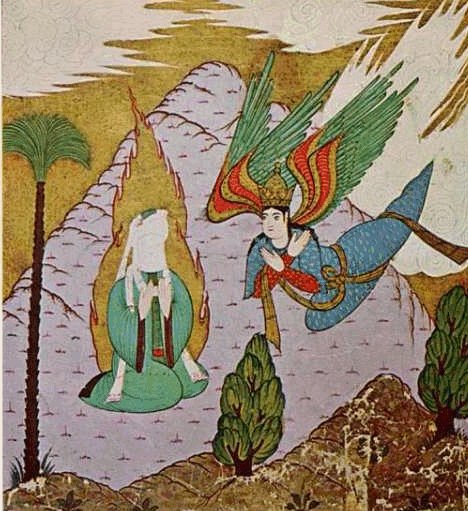After some time, whether to reassure Muhammad (as seems likely) or of her own accord, Khadija decided to test Jibril:
[Khadija] said to the apostle of God, ‘O son of my uncle, are you able to tell me about your visitant, when he comes to you?’
He replied that he could, and she asked him to tell her when he came. So when Gabriel came to him, as he was wont, the apostle said to Khadija, ‘This is Gabriel who has just come to me.’
‘Get up, O son of my uncle,’ she said, ‘and sit by my left thigh.’
The apostle did so, and she said, ‘Can you see him?’
‘Yes,’ he said.
She said, ‘Then turn round and sit on my right thigh.’
He did so, and she said, ‘Can you see him?’
When he said that he could she asked him to move and sit in her lap. When he had done this she again asked if he could see him, and when he said yes, she disclosed her form and cast aside her veil while the apostle was sitting in her lap.
Then she said, ‘Can you see him?’
And he replied, ‘No.’
She said, ‘O son of my uncle, rejoice and be of good heart, by God he is an angel and not a satan.’
I told Abdullah b. Hasan this story and he said, ‘I heard my mother Fatima, daughter of Husayn, talking about this tradition from Khadija, but as I heard it she made the apostle of God come inside her shift, and thereupon Gabriel departed, and she said to the apostle of God, “This verily is an angel and not a satan.”’
Ibn Sa’d
This quirky story, based on the odd superstitions of a recently pagan woman, has been given doctrinal authority in Islam. The question of “Can Allah see you in the bathroom?” is actually a real, vexed question debated by actual Islamic scholars because of this and similar passages where an angel is chased away (or unable to enter) because of some human activity, each side declaring the other blasphemous and even sometimes deserving of death with absolute seriousness.
There are countless instances where small things such as this, taken with the seriousness that they must be taken with in Islam, lead to some very untenable conclusions that either must be clung to fiercely or must be done away with. If a hadith is judged to be authentic, its theological ramifications cannot just be dismissed as silliness, or all of Islamic belief is in danger.
There is nothing like this in Christianity. There is also nothing like this in the Tanakh. However, Orthodox Judaism does have many similarities with Islamic belief, in that the Talmud is more important even than the Torah in authority, and this belief forces people into many very intellectually untenable positions. We will see as we go forward that Talmudic views and influence on Islam underlie the very worldview that is encoded in the Quran. Combined with a unique Islamic militantism, the result is disaster.






